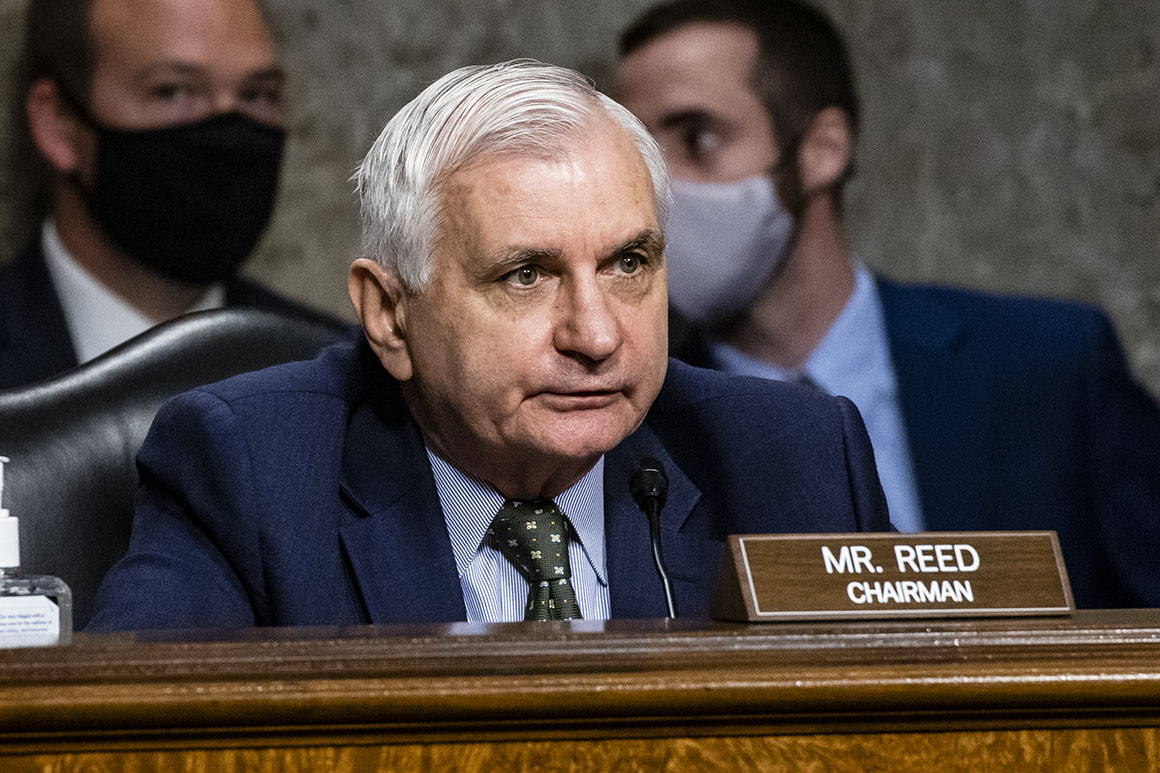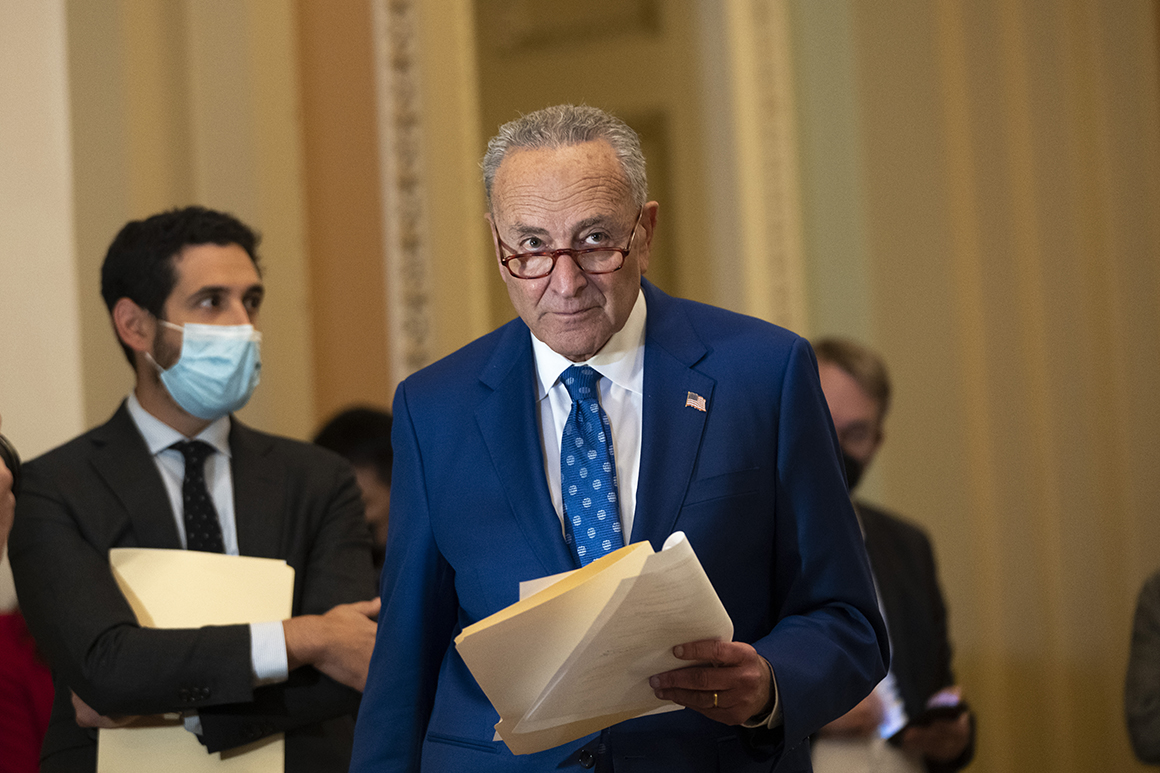
Senators are clamoring to ensure their proposals are included in must-pass defense policy legislation as the upper chamber slowly slogs through consideration of its version of the bill.
Nearly 1,000 amendments have been filed ahead of debate on the annual National Defense Authorization Act, which is finally on the Senate floor after a months-long delay.
The defense bill cleared its first hurdle with a blowout vote Wednesday to hasten the start of debate. But early fault lines have developed between Democrats and Republicans over what amendments should be fast-tracked for votes.
Majority Leader Chuck Schumer is pressing for the Senate to quickly vote on an array of proposals and finalize the bill in the coming days, a move that will require GOP senators to consent to speed the process.
"We should work together and complete this important bill before the Thanksgiving holiday," Schumer said on the Senate floor.

Schumer is pushing for a vote to repeal the 2002 Iraq War authorization as part of the Pentagon policy bill, after pledging to put the Senate on the record on the bipartisan effort to begin rolling back sprawling presidential war powers.
Republican leader Mitch McConnell of Kentucky, meanwhile, has laid out the GOP’s own priorities — including votes to impose sanctions stemming from the Russian-built Nord Stream 2 pipeline, supplying Ukraine with more money for weapons and clarifying that leftover Afghanistan aid cannot flow to the Taliban.
"I'm glad we will finally be able to have these debates and these votes," McConnell said. "America needs a course correction and the Senate needs to supply it."
Senate Armed Services Chair Jack Reed (D-R.I.) and ranking Republican Jim Inhofe of Oklahoma are also aiming strike a deal to include a manager’s package of bipartisan, uncontroversial amendments in the bill.
The proposals that the Senate could consider over the coming days run the gamut, including confronting China, slashing defense spending, reining in expansive presidential war powers and reviewing the 20-year U.S. involvement in Afghanistan that concluded in August.
Senators may revisit some familiar proposals, such as efforts by progressives to slash the Pentagon budget by upwards of 10 percent and a push to hitch annual intelligence policy legislation to the broader defense bill.
Other amendments in the works include conservative efforts to strip out a bipartisan provision that requires women to register for a military draft. Another proposal would authorize the U.S. military to defend Taiwan if China invades the island, while another would force a diplomatic boycott of 2022 Winter Olympics in Beijing over China's human rights record.
Armed Services leaders may also look to rearrange more than $3 billion in funding the bill authorizes for Afghanistan's now-defunct armed services, which senators approved before the Taliban's takeover of the country.
Here's a snapshot of some of the consequential amendments senators have filed:
War powers: Several senators are pushing to roll back outdated and expansive presidential war powers in the defense bill.
Sen. Tim Kaine (D-Va.) has introduced an amendment to repeal the 1991 Gulf War and 2002 Iraq War authorizations as an amendment to the defense bill. The Senate Foreign Relations Committee backed Kaine's bipartisan legislation to repeal both in August.
Schumer vowed to allow a vote this year to repeal the 2002 Iraq authorization, but the effort has stalled since the summer. Now, the Democratic leader is throwing his weight behind ensuring the repeal is included in the defense bill.
"The Iraq War has been over for a decade and ... an authorization passed in 2002 is no longer necessary to keep Americans safe in 2021," Schumer said.
Despite earning support from Republicans who see the 2002 AUMF as outdated, McConnell dinged the repeal as a move that would give the U.S. less military flexibility in the Middle East.
"I expect a robust debate about that," McConnell said.
Though advocates have previously tried to use the defense bill to curtail presidential war powers, leaders have often avoided forcing the issue on the must-pass bill.
The full House, meanwhile, has passed standalone legislation to repeal the decades-old authorizations.
Women in the draft: The bill includes a provision that would require women to register for a military draft, but some conservative Republicans are pushing to strip the provision.
Opponents of expanding the Selective Service beyond men are in need of a win. The House-passed defense bill includes a similar provision expanding a potential military draft. If the provision clears the Senate intact, it's highly likely to become law in a final bill.
The chief critic, Missouri Republican Josh Hawley, has offered an amendment to strip the provision along with five other GOP senators. Inhofe and Sen. Mike Lee (R-Utah) have also offered identical amendments.
Despite vocal opposition from conservative lawmakers and groups — as well as progressives who want to see the draft system abolished — efforts to undo the provision almost certainly don't have the votes to win adoption. SASC approved the provision with bipartisan support, including eight of the panel's 13 Republicans.
Budget: Senate Budget Chair Bernie Sanders (I-Vt.) is seeking again to slash the defense budget top line by 10 percent, an annual effort from progressives who contend the money is better spent on the home front.
Sanders' amendment would reduce the total funding authorized by the bill, save personnel or health accounts, by 14 percent, a move that would wipe out the extra $25 billion the Senate Armed Services Committee added to the topline above Biden's $715 billion request and then cut the president's budget by roughly 10 percent.
The effort was turned back on the Senate floor last year, though high profile Democrats backed Sanders' quest to deliver a steep cut to Pentagon spending, including Schumer and now-Majority Whip Dick Durbin of Illinois.
A similar progressive proposal was soundly rejected in the House. A narrower measure to roll back the $25 billion increase to Biden's defense budget also failed, though the majority of House Democrats backed undoing the increase.

China and Taiwan: Several senators aim to spur a debate on adopting a more aggressive posture on defending Taiwan amid heightened concerns that China could move to invade the island.
Many Republicans, and even some Democrats, have sought to scrap the longtime policy of strategic ambiguity, enshrined in the 1979 Taiwan Relations Act, that is noncommittal about whether the U.S. would defend Taiwan from a Chinese invasion. Biden has himself sent mixed messages, saying last month that "we have a commitment" to defend Taiwan from attack before the White House clarified that the president wasn't signaling a shift in policy.
Sen. Rick Scott (R-Fla.), an advocate of pivoting away from strategic ambiguity, has filed an amendment to preemptively authorize Biden to use military force to defend Taiwan from an attack or invasion by China. The authorization would be valid for five years.
Senators in both parties have also pushed to limit U.S. involvement in the Winter Olympics set to take place in Beijing next year in protest of human rights abuses by China.
An amendment spearheaded by Sen. Mitt Romney (R-Utah) — along with Sens. Todd Young (R-Ind.), Ed Markey (D-Mass.) and Kaine — calls for a diplomatic boycott of the Beijing Olympics and would bar funding for U.S. officials to attend the games.
The Biden administration has faced pressure to boycott the games over Beijing's treatment of its Uyghur Muslim minority, which it has called a genocide. Lawmakers on both sides of the aisle have urged a diplomatic boycott in which government officials don't attend, including House Speaker Nancy Pelosi (D-Calif.).
Afghanistan: Several amendments have been offered to examine the war in Afghanistan, including the consequences of the Biden administration's withdrawal of U.S. troops.
Sen. Tammy Duckworth (D-Ill.) is pushing for a vote to launch an independent review of the two-decade-long conflict, a move Reed backs. The House NDAA includes a provision sponsored by Rep. Liz Cheney (R-Wyo.) to impanel a 12-member bipartisan commission to examine the war and make recommendations on lessons to be learned from it.
Lawmakers will also need to reallocate the $3.3 billion for Afghan army training. The Senate bill, which was crafted before the Taliban's takeover, approved the money, while the House diverted nearly all of the cash to other accounts.
Senate Armed Services leaders haven't yet proposed how to redirect the Afghanistan security money, though several amendments have been filed that aim to shift Afghanistan aide that won't be spent in the wake of the withdrawal.
Sen. Rand Paul (R-Ky.) filed an amendment that would prohibit payments to the Taliban and rescind any funding for Afghanistan that was already appropriated but has gone unspent, including money for the Afghan armed forces. And a Sen. Marco Rubio (R-Fla.) amendment would divert the unobligated Afghanistan money toward accounts aimed at countering China, including Navy shipbuilding and research and development programs conducted by the Defense Advanced Research Projects Agency.
Nukes: The bill largely endorses Pentagon proposals to overhaul each leg of the nuclear triad and modernize the associated warheads, and critics of nuclear weapons spending are pushing an array of proposals to cut programs and alter U.S. policy.
Markey, a progressive nuclear spending critic, has several proposals to curtail nuclear weapons spending. One amendment would block funding for the Ground Based Strategic Deterrent and the accompanying W87-1 warhead until the Pentagon submits the findings of an independent study into whether the current Minuteman III missiles can be extended to 2050 and the defense secretary certifies that such an extension can't be done safely.
Another amendment from Markey would declare a no-first-use nuclear weapons policy and bar the military from using its funding to conduct a first-use nuclear strike.
Defense hawks are pushing back at efforts to slash nuclear spending. Sen. John Hoeven (R-N.D.) and 15 other Republicans offered an amendment that would block the reduction of the U.S. nuclear stockpile and the number of strategic delivery systems from the current levels over the next five years.
Buy American: Duckworth has filed an amendment to boost Buy American requirements for major defense programs amid slowdowns in the global supply chain and concerns about the state of the defense industrial base.
Her amendment, offered alongside Sens. Kirsten Gillibrand (D-N.Y.) and Tammy Baldwin (D-Wis.), would raise the threshold of the share of U.S.-made components in a defense program over the next decade, topping out at 75 percent by 2029.
The measure mirrors a proposed Biden administration rule and a provision attached to the House NDAA by Rep. Donald Norcross (D-N.J.).

Weapons: Funding decisions made by Armed Services on military hardware typically don't see major changes on the floor, but senators are pushing to tweak funding for some of their favored programs or are taking aim at efforts to preserve older weapons.
Republicans Rubio, Scott and Mike Braun of Indiana filed an amendment to strip out a provision that bars the Air Force from retiring any of its A-10 close-air support jets. Its adoption would clear the way for the Air Force to retire dozens of the planes, which the service pitched as part of an effort to shed aging aircraft to save money.
Wisconsin Sens. Baldwin and Ron Johnson want to authorize $109 million for the Army to purchase heavy tactical trucks built by Oshkosh in the state. Their amendment would offset the new funding by tapping into the $3.3 billion for Afghan training.
Republican Lindsey Graham of South Carolina is also seeking to undo a provision in the bill that blocks the Air National Guard from receiving more F-35s until the active-duty Air Force takes possession of more planes and the ratio of the jets in the active component and Guard is greater than 4-to-1.
On the shipbuilding front, Republican Roger Wicker of Mississippi and Kaine want to boost research and development for Columbia-class submarines by $25 million, the ship-to-shore connector landing craft by $10 million and industrial base support by $2 million. The extra funding would be offset by cutting procurement dollars for the Navy's LHA replacement amphibious ship.
Intel policy debate: Senate Intelligence Committee Chair Mark Warner (D-Va.) and Rubio, the panel’s top GOP member, have filed their panel's annual intelligence policy bill as an amendment to the NDAA.
The legislation was approved by the Intelligence Committee in July, but has seen no floor action. In recent years, Senate leaders have attached the intelligence measure onto the defense bill to bypass floor debates and more easily get the bill to the president's desk.
The House-passed defense bill doesn't include that chamber's version of the intelligence measure, which was approved by the House Intelligence Committee in September.
Previous attempts to pass the measure as part of the NDAA have come up short, though lawmakers have had more success enacting it through year-end omnibus funding legislation.
----------------------------------------
By: Connor O’Brien
Title: Nine things to watch as the Senate debates the defense bill
Sourced From: www.politico.com/news/2021/11/18/senate-debates-defense-bill-what-to-watch-522987
Published Date: Thu, 18 Nov 2021 17:05:39 EST






